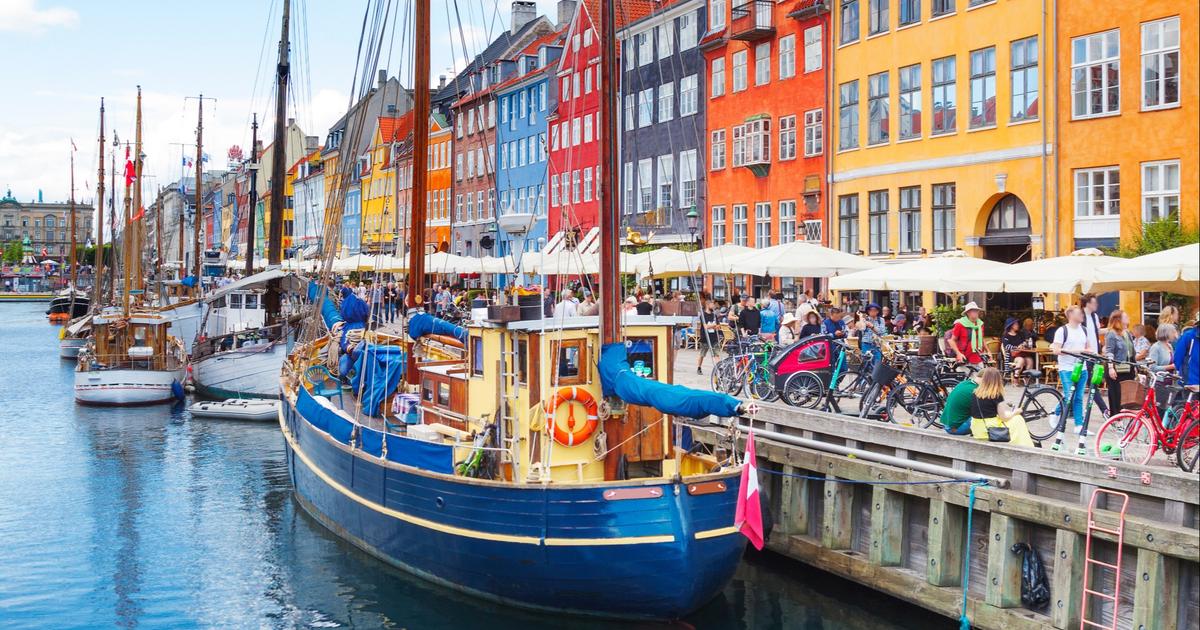Enlarge image
The close bond with their parents is only one reason why young people stay at home
Photo:
Duet Postscriptum / Stocksy United
If you move out of home, you suddenly have a lot of freedom: wild flat share parties, sleeping until lunchtime and frozen pizza for breakfast.
There is a lot to learn - and to do: shop, cook, clean, get by on your own.
For more than a quarter of 25-year-olds in Germany, this is not an issue; they still live with their parents.
This is shown by data from the Federal Statistical Office for 2020, which were recently published.
The European leader in late moving out is Croatia - with an average of 32.4 years.
The boys are only a little more than half their age, namely 17.5 years, when they move out in Sweden.
Almost everywhere, the sons give themselves more time.
About the so-called nestling: there are many clichés inside.
Don't you dare to live alone?
Are you too lazy for housework?
Or are there other reasons for living with your parents?
Four young people tell why they really stayed - and how they feel about it.
"I translate for my mother at the doctor, I help my father with bureaucracy."
Yasemin Sanli, 26, is studying industrial engineering as a master at the Darmstadt University of Applied Sciences and lives with her parents in the Odenwald district.
»After my bachelor's degree, I wanted to move out and start working.
Unfortunately that didn't work out, also because of Corona.
And without a job, I couldn't afford an apartment.
So I stayed with my parents and started doing a Masters degree.
My father is a guest worker child, my mother and he met in his home village in Turkey, she came to Germany for him.
Her German is not good enough for bureaucracy or doctor's appointments, I accompany her and translate.
I also take care of appointments with authorities or the bank.
My two siblings also help, but because, unlike them, I'm not yet working, I'm more flexible and often step in.
My father is a self-employed heating oil tank fitter.
I help him with office work about five hours a week, a little every evening.
Then I write invoices, take care of new orders and mail, and file documents.
But I also get a lot of help back.
I am the first in my family to study.
That was a big step for me that overwhelmed me at the beginning.
During this time it helped me a lot that I didn't have to worry about anything else.
My mom is a housewife, she goes shopping, there is always food on the table.
That is a luxury.
In the evening we all sit together, eat, talk about the day, laugh a lot.
On the weekends we drink strong black tea in small glasses and eat fruit in front of the TV, it's a Turkish ritual.
During the pandemic, I especially learned to appreciate time with my family.
Even though I still live at home, my relationship with my parents has changed.
We now speak more at eye level, they tell me about their worries and take mine more seriously.
At one point everything became too much for me, studying and working at home.
They noticed that.
They told me that while they appreciate the help, they don't ask for it.
And: ›Don't take on the parenting role.‹ We have been talking even more openly since then.
In a year I would like to hand in my master’s thesis and move out.
We siblings then have to split up the work better among ourselves.
But it is also clear: I still want to be there for my parents. "
"My whole circle of friends still lives nearby"
Katharina Witt, 25, is studying sociology at the University of Cologne and lives with her parents in a village about 50 km away.
“I am very deeply rooted in my home village.
Almost all of my friends from school still live nearby.
I also have a close friend from college, but I don't see her very often.
When I'm invited to a university party, living so far from Cologne is a problem: I commute from my parents' house to the university for an hour and a half.
Sometimes I think I miss out on typical university life as a result.
But I also know myself: I wouldn't celebrate often, no matter where I live.
That's why I can quickly get to my old friends here by car: inside.
See you at least once a week.
Then we meet at someone's home, chat, eat together or watch a movie.
Quite boring, but nice.
My younger sister still lives here.
We usually all get together in the evenings - my parents, my sister and I - and my father cooks for us.
The rest of my family also live nearby; it's less than a five-minute walk to my grandma.
Sometimes there are annoying discussions, for example when I have breakfast at nine o'clock in the morning and my parents say: 'Oh, have you slept that long again?' I sat on a university assignment until eleven o'clock at night. My parents didn't study and therefore don't know the rhythm that I have as a student. At my age they lived together and worked full-time.
In my part-time job as an assistant at the university, I earn 400 euros a month, the money might barely be enough for a room in a shared apartment in Cologne, but not for living. Many of my fellow students who live alone work a lot or receive money from their families. I don't want that. My parents support me by feeding me at home. But they shouldn't sell their car or stop going on vacation just because I really wanted to study.
I would like to go abroad for a semester.
That would be a change, so far from home.
I will probably move out permanently as soon as I have my first job after graduation.
But it doesn't have to happen directly either.
I definitely want to stay in this area.
If I should have children later, visiting my grandma should be something everyday.
Whatever it was for me. "
"I decided for home and against a career in science"
Tobias Mini, 27, is doing a doctorate in business informatics at the University of Passau and lives with his parents in a village nearby.
»After graduating from high school, I had to decide whether to study in my hometown of Passau or in Munich, where there is a pretty good university. I chose Passau - and it was clear that I would continue to live in my parents' house. We get along very well. And so I was able to concentrate better on my studies: no part-time job and no household to take care of during the exam phase.
I just faced the same decision again.
I am almost finished with my doctorate and had to consider whether I should aim for a professorship.
I could stay here for another five to seven years, at a postdoc position, and then do my habilitation.
I would really like to continue working in science; I really enjoy doing a doctorate.
But for the professorship at the latest, I would have to look for a position all over the world.
With luck, I would end up somewhere in Germany, but definitely not here in the region.
more on the subject
New youth study: Climate protection?
But not without my car
Architect on living while studying: When ventilation becomes a luxuryAn interview by Markus Sutera
Against Greta, against gender: Why young people vote conservativelyBy Adrian Breda and Yasemin Yüksel
For me, Passau and my parents' house are home.
I know everyone here, I feel good here.
My parents always gave me support when things got difficult during my studies.
That would break away elsewhere.
If I were to move to a city like Copenhagen for a professorship, I wouldn't know anyone and everything would be strange.
I can't imagine that it could feel like home.
My parents told me they would be happy if I stayed here.
And that I could take over my parents' house someday.
So let's do it now.
I chose my homeland and against a career in science.
Now I'm writing applications for a job in business, here in the region.
I still live in my teenage room.
I replaced the Playstation with a large desk with several screens.
My brother and his girlfriend will soon be moving out, and then the attic apartment will be free for me.
I look forward to more privacy and to inviting friends inside.
Otherwise little will change.
I do not want that either.
I want to continue spending as much time with my parents as I have before.
We meet for breakfast, lunch, coffee and dinner.
So we always know what's going on with the others.
For me, that's the best thing about living together. "
"I mostly hold back in the household"
Elias Bentele, 22, trained as a banker and lives with his parents in Unterallgäu.
»Sometimes I clear out the dishwasher or hang up the laundry, but mostly I hold back around the house.
On the one hand I live at home for convenience, on the other hand it saves me money.
8,000 people live here in Ottobeuren, the range of apartments is small - and the ones I like are too expensive for me.
I have been a trained banker since February and drive 40 kilometers to work every day.
The car is mine, I bought it together with my parents in the summer of 2018 after graduating from high school.
This flexibility is important to me, also to visit friends.
Most of them still live with their parents.
I have a relaxed, friendly relationship with my mother and father, we have breakfast together every morning.
Of course, it sucks when I am asked to do this or that.
My parents may also be bothered when I come home at night and they wake up because the floorboards in our house creak.
My attic room is about twelve square meters.
Bed, TV, small sofa, wardrobe.
That's enough.
But it is not a permanent condition.
Should I move out, my parents would probably not cheer for joy, but then they could use the house as they wish.
When the time comes depends on where I will work in the future and how much I will earn.
I can imagine doing further training at my bank.
And then - let's see. "


/cloudfront-eu-central-1.images.arcpublishing.com/prisa/KTTBFHLHG5EGVAJA3JDPLURK7A.jpg)






